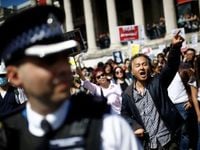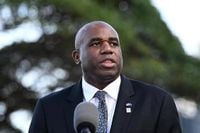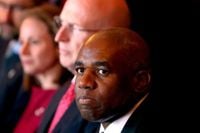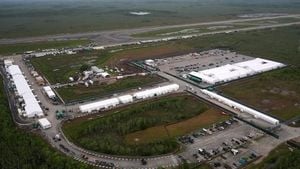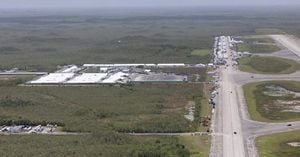On July 25, 2025, Hong Kong police escalated their crackdown on overseas pro-democracy activists by announcing cash rewards for information leading to the arrest of 19 individuals accused of violating the national security law imposed by Beijing. These activists are alleged members of the so-called "Hong Kong Parliament," a group that authorities claim aims to promote self-determination and draft a "Hong Kong constitution" through illegal means intended to overthrow or undermine China's fundamental system and the governing institutions of Hong Kong and Mainland China.
The Hong Kong Police Force, acting upon a court order, issued arrest warrants for prominent activists including Elmer Yuen, Johnny Fok, Tony Choi, Victor Ho, Keung Ka-wai, and 14 others. Victor Ho, a former editor of Canada’s Sing Tao daily and a resident of Richmond, British Columbia, is among those targeted. Ho revealed that two additional individuals wanted by Hong Kong authorities also reside in Metro Vancouver. The group reportedly organized or participated in an overseas election for the Hong Kong Parliament, which according to a June 30 Facebook post by the group, garnered approximately 15,700 valid votes via mobile app and online voting systems. Candidates and elected members hail from diverse regions such as Taiwan, Thailand, Australia, the United States, Canada, and Britain.
Despite calling itself the Hong Kong Parliament, the group's electoral organizing committee was founded in Canada, and its influence is considered limited. Police had previously offered rewards of one million Hong Kong dollars (about $127,400 USD) for information leading to the arrest of Yuen, Ho, Fok, and Choi, while the remaining 15 activists have bounties set at 200,000 Hong Kong dollars (approximately $25,480 USD). Authorities warned that the investigation remains ongoing and additional bounties may be offered to apprehend other suspects. They urged the wanted individuals to cease their activities and surrender voluntarily to avoid further consequences.
Elmer Yuen, speaking in a Facebook Live broadcast, acknowledged that the election did not attract significant active participation but suggested that the police campaign inadvertently served as "a lot of advertising" to rally support for the resistance movement. Meanwhile, Sasha Gong, another activist targeted by the bounties and a U.S. citizen, condemned Hong Kong's transformation into a police state and announced plans to report her case to American authorities and lawmakers.
The issuance of these arrest warrants and bounties represents the largest tally yet in Hong Kong’s ongoing efforts to suppress dissent beyond its borders. Over the past two years, authorities have similarly targeted overseas activists, including former pro-democracy lawmakers Nathan Law and Ted Hui, often canceling their passports under a new security law enacted in 2024. These moves have sparked international criticism, especially from Western governments, who highlight that Hong Kong was promised Western-style civil liberties and a high degree of autonomy for at least 50 years following its 1997 handover from British to Chinese rule.
In response to these developments, British Foreign Secretary David Lammy and Home Secretary Yvette Cooper issued a joint statement on July 25 condemning Hong Kong’s actions as "another example of transnational repression." They called on China to halt its targeting of opposition voices within the UK, where approximately 150,000 Hong Kong residents have migrated under a special visa scheme introduced in 2021. The statement emphasized the UK government's commitment to protecting the rights, freedoms, and safety of Hong Kong nationals who have made Britain their home.
Lammy and Cooper also expressed concerns over recent proposals by the British government to reform extradition rules, which some fear could reopen the door to extraditions to Hong Kong. Since the 2020 national security law was enacted, extraditions to Hong Kong have been suspended amid fears over fair trial guarantees and political persecution. The UK Home Office applied to Parliament in mid-July 2025 to amend extradition legislation, with Security Minister Dan Jarvis stating it is in the national interest to maintain effective extradition relationships to prevent the UK from becoming a haven for criminals. The government also plans to restore extradition frameworks with Chile and Zimbabwe, with cases for Hong Kong and Zimbabwe to be considered on a case-by-case basis.
Across the Atlantic, the United States sanctioned six Chinese and Hong Kong officials in March 2025 for their alleged involvement in "transnational repression" and actions undermining Hong Kong's autonomy. Beijing and Hong Kong authorities maintain that the national security laws are vital for maintaining stability and assert that the law applies to permanent Hong Kong residents who violate it abroad. In retaliation, China announced sanctions in April 2025 against U.S. officials, lawmakers, and NGO leaders it accused of "performing poorly" on Hong Kong issues.
Victor Ho, who has lived in Richmond for 25 years, has faced charges from Hong Kong three times: first in July 2020 when the national security law was enacted, then on Christmas Eve 2024, and most recently in July 2025. Ho rejects the label of "fugitive," stating, "I never ran away. I was just living here in Canada. I’ve been a Chinese Canadian for over 20 years. I’m purely Canadian; never again a Hong Kong Chinese or Chinese Hong Konger. … I’m just exercising my freedom of speech on Canadian soil. … I’m living here. Not scared, not threatened. I have no fear of that bounty. This is very legitimate for a Hong Kong people overseas to try to exercise the democratic rights organized to participate in the election without fear." His resolute stance exemplifies the broader tension between activists abroad and the tightening grip of Beijing on Hong Kong’s political landscape.
The ongoing saga underscores the complex interplay between Hong Kong’s promised autonomy, the national security laws imposed by Beijing, and the international community’s response to what many perceive as an erosion of freedoms. As the investigation continues and more bounties may be announced, the global spotlight remains fixed on how Hong Kong’s authorities wield their expanded powers beyond their borders, and how foreign governments balance diplomatic relations with protecting human rights and democratic values.
